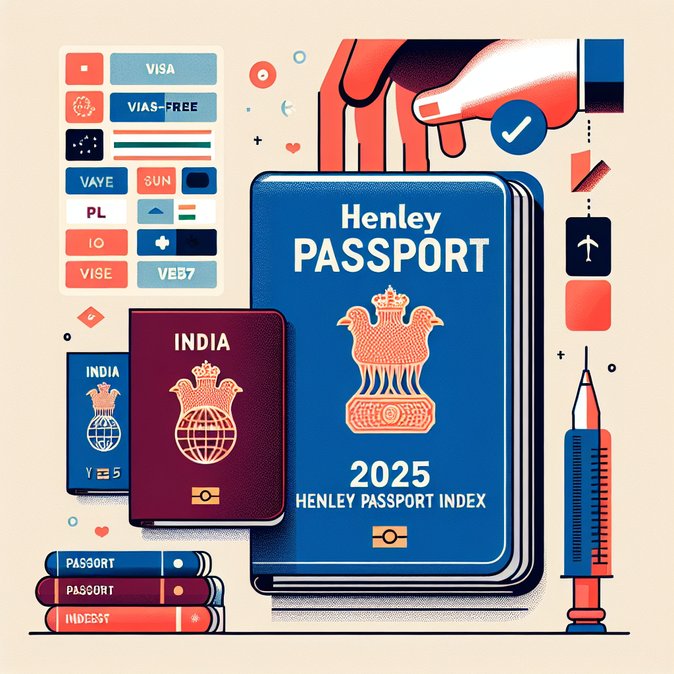
India’s passport power has taken a noticeable hit. The 2025 edition of the Henley Passport Index, released on 24 October, shows the Indian passport falling five places to 85th globally, with holders now enjoying visa-free, visa-on-arrival or e-travel authorisation access to only 57 countries—down from 62 last year. The slip comes despite sustained diplomatic outreach and a growing economy, underscoring how fiercely competitive the global mobility landscape has become.
Why the drop? Analysts point to two factors. First, several African and Caribbean micro-states introduced pre-departure electronic travel authorisation requirements during 2025 to screen visitors more rigorously—rules that now apply to Indian travellers. Second, a handful of Pacific island nations have re-aligned visa-waiver policies in favour of OECD partners in exchange for aid and climate-finance packages, leaving India outside the waiver circle. While five places may appear minor, each ranking band represents roughly half-a-dozen destinations; losing access to five countries can quickly raise travel budgets for Indian businesses scouting new markets.
For multinational companies based in India the implications are immediate. Mobility managers must re-audit travel-risk matrices, update visa lead-time calculators and review corporate credit-card limits: an extra US $100–150 per short-notice embassy visa can eat into project margins. Sectors most exposed include IT services, pharmaceuticals and engineering-procurement-construction firms that routinely deploy technical teams to Africa, the Caribbean and the South Pacific.
Government officials have down-played the slide, stressing that 59 destinations still permit hassle-free entry (some categories remain grandfathered for earlier agreements). They also highlight new negotiations under way with Serbia, Kenya and Ecuador that could restore India’s visa-free tally to the low-60s in 2026. Nonetheless, travel-industry associations are urging the Ministry of External Affairs to accelerate broader, reciprocal visa-waiver pacts, arguing that stronger passport power is now integral to India’s ambition of becoming a top-three global economy by 2030.
In the meantime, frequent flyers should expect longer embassy queues and beefed-up document scrutiny at several once-easy ports of entry. Experts advise corporate travellers to file applications at least 15 working days in advance, double-check passport validity (minimum six months) and carry proof of accommodation even for destinations that still list ‘visa-on-arrival’. A cautious approach, they say, is the best antidote to India’s diminished passport privilege—for now.
Why the drop? Analysts point to two factors. First, several African and Caribbean micro-states introduced pre-departure electronic travel authorisation requirements during 2025 to screen visitors more rigorously—rules that now apply to Indian travellers. Second, a handful of Pacific island nations have re-aligned visa-waiver policies in favour of OECD partners in exchange for aid and climate-finance packages, leaving India outside the waiver circle. While five places may appear minor, each ranking band represents roughly half-a-dozen destinations; losing access to five countries can quickly raise travel budgets for Indian businesses scouting new markets.
For multinational companies based in India the implications are immediate. Mobility managers must re-audit travel-risk matrices, update visa lead-time calculators and review corporate credit-card limits: an extra US $100–150 per short-notice embassy visa can eat into project margins. Sectors most exposed include IT services, pharmaceuticals and engineering-procurement-construction firms that routinely deploy technical teams to Africa, the Caribbean and the South Pacific.
Government officials have down-played the slide, stressing that 59 destinations still permit hassle-free entry (some categories remain grandfathered for earlier agreements). They also highlight new negotiations under way with Serbia, Kenya and Ecuador that could restore India’s visa-free tally to the low-60s in 2026. Nonetheless, travel-industry associations are urging the Ministry of External Affairs to accelerate broader, reciprocal visa-waiver pacts, arguing that stronger passport power is now integral to India’s ambition of becoming a top-three global economy by 2030.
In the meantime, frequent flyers should expect longer embassy queues and beefed-up document scrutiny at several once-easy ports of entry. Experts advise corporate travellers to file applications at least 15 working days in advance, double-check passport validity (minimum six months) and carry proof of accommodation even for destinations that still list ‘visa-on-arrival’. A cautious approach, they say, is the best antidote to India’s diminished passport privilege—for now.





